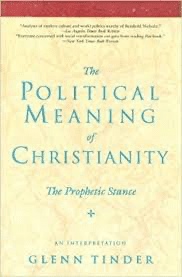The Political Meaning of Christianity: Social Reform
Here I take up two more sections of Glenn Tinder’s book The Political Meaning of Christianity: Chapter Four, Social Transformation, sections Prophetic Hope and Social Reform and Communal Liberation and the Will of God (pp. 151-165).
Among other things, Tinder asserts that, in spite of “the Christian record,” “Christianity in essence is not conservative.” (153) Here again we encounter the implied difference between what I have called “empirical Christianity” (the churches and their leaders and political adherents) and “authentic Christianity.” The two are not always different, but often they are.
What does Tinder mean? That “Christians are…mistrustful of aristocracies and elites.” (154) Here here means authentic Christians. “Christian principles place one in a radical—that is, critical and adverse—relationship to established institutions. The Kingdom of God is a judgment on the existing society.” (154) “We cannot maintain the prophetic stance while taking care that established institutions are preserved in their present form.” (155)
On the other hand, according to Tinder, Christianity is cautious about the possibilities of reform. “Christianity is in a true sense radical, but it is also hesitant.” (159) This because Christianity knows about the fallenness of humanity and how even the best intentions of the best reformers can be complicated by selfishness and pride.
In “Communal Liberation and the Will of God” Tinder critiques Liberation Theology for not hesitating and leaving room for dialogue or using persuasion before force. On the one hand, Tinder says, we cannot rule out socialism as incompatible with what we know of human nature. (163) And yet, we cannot use socialism or any other ideology as the absolute template of some “earthly paradise” to be brought about by force.
Buried in these pages is Tinder’s vision of justice—a balancing of liberty and equality. He believes the discovery and establishment of justice requires an understanding of sin and grace. “When sin and grace are neglected, social reform is misunderstood.” (165) He advocates spiritual change as a necessary aspect of social transformation, yet he does not advocate quietism. What action is called for? What force is justified? So far he has not answered these crucial questions. Hopefully he will in the next section entitled “Revolution.”
If you are like me, you are chomping at the bit to get to that. I will take it up, together with “Inequality and Minority Rule,” in a week (give or take a day or two).
Personally, I am not quite convinced by Tinder’s criticisms of liberation theology. I have studied it and taught it for decades. There are varieties of liberation theology. I prefer to talk about liberation theologies rather than liberation theology in singular. Gustavo Gutierrez argues that the essence of all liberation theology is God’s and our “preferential option for the poor.” From there, liberation theologians diverge as to strategies. Gutierrez advocated strong persuasion and use of force as a last resort. I don’t think Gutierrez was guilty of the charges Tinder lays against liberation theology. I wonder how much liberation theology Tinder read.
*Note: If you have read these pages in the book, feel free to comment and/or ask questions. If you have not read them, feel free to ask questions but do not comment. In any case, keep your comments or questions relatively brief (no more than 100 words), on topic, addressed to me, civil and respectful (not hostile or argumentative), and devoid of pictures or links.*














